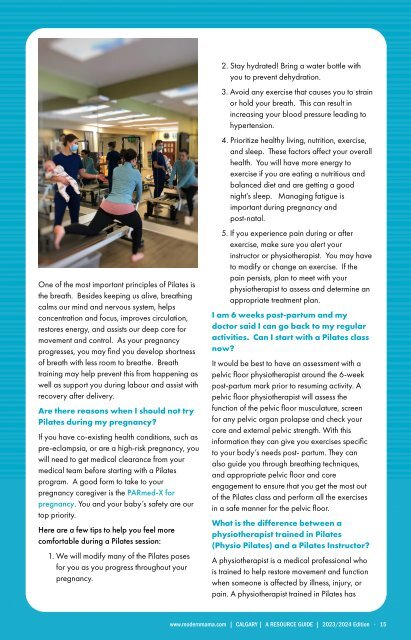Calgary Baby Guide 2023-2024
Create successful ePaper yourself
Turn your PDF publications into a flip-book with our unique Google optimized e-Paper software.
One of the most important principles of Pilates is<br />
the breath. Besides keeping us alive, breathing<br />
calms our mind and nervous system, helps<br />
concentration and focus, improves circulation,<br />
restores energy, and assists our deep core for<br />
movement and control. As your pregnancy<br />
progresses, you may find you develop shortness<br />
of breath with less room to breathe. Breath<br />
training may help prevent this from happening as<br />
well as support you during labour and assist with<br />
recovery after delivery.<br />
Are there reasons when I should not try<br />
Pilates during my pregnancy?<br />
If you have co-existing health conditions, such as<br />
pre-eclampsia, or are a high-risk pregnancy, you<br />
will need to get medical clearance from your<br />
medical team before starting with a Pilates<br />
program. A good form to take to your<br />
pregnancy caregiver is the PARmed-X for<br />
pregnancy. You and your baby’s safety are our<br />
top priority.<br />
Here are a few tips to help you feel more<br />
comfortable during a Pilates session:<br />
1. We will modify many of the Pilates poses<br />
for you as you progress throughout your<br />
pregnancy.<br />
2. Stay hydrated! Bring a water bottle with<br />
you to prevent dehydration.<br />
3. Avoid any exercise that causes you to strain<br />
or hold your breath. This can result in<br />
increasing your blood pressure leading to<br />
hypertension.<br />
4. Prioritize healthy living, nutrition, exercise,<br />
and sleep. These factors affect your overall<br />
health. You will have more energy to<br />
exercise if you are eating a nutritious and<br />
balanced diet and are getting a good<br />
night’s sleep. Managing fatigue is<br />
important during pregnancy and<br />
post-natal.<br />
5. If you experience pain during or after<br />
exercise, make sure you alert your<br />
instructor or physiotherapist. You may have<br />
to modify or change an exercise. If the<br />
pain persists, plan to meet with your<br />
physiotherapist to assess and determine an<br />
appropriate treatment plan.<br />
I am 6 weeks post-partum and my<br />
doctor said I can go back to my regular<br />
activities. Can I start with a Pilates class<br />
now?<br />
It would be best to have an assessment with a<br />
pelvic floor physiotherapist around the 6-week<br />
post-partum mark prior to resuming activity. A<br />
pelvic floor physiotherapist will assess the<br />
function of the pelvic floor musculature, screen<br />
for any pelvic organ prolapse and check your<br />
core and external pelvic strength. With this<br />
information they can give you exercises specific<br />
to your body’s needs post- partum. They can<br />
also guide you through breathing techniques,<br />
and appropriate pelvic floor and core<br />
engagement to ensure that you get the most out<br />
of the Pilates class and perform all the exercises<br />
in a safe manner for the pelvic floor.<br />
What is the difference between a<br />
physiotherapist trained in Pilates<br />
(Physio Pilates) and a Pilates Instructor?<br />
A physiotherapist is a medical professional who<br />
is trained to help restore movement and function<br />
when someone is affected by illness, injury, or<br />
pain. A physiotherapist trained in Pilates has<br />
www.modernmama.com | CALGARY | A RESOURCE GUIDE | <strong>2023</strong>/<strong>2024</strong> Edition • 15










